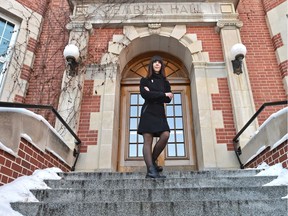Five Indigenous students make history by undertaking PhD in native studies at University of Alberta

Article content
Five Indigenous students have become the first cohort to undertake a PhD at the University of Alberta’s faculty of native studies, a watershed moment for the province’s largest university.
The faculty, recognized as the only independent faculty of native studies in North America, has been building the three-year doctoral program since 2012 to add to its four undergraduate programs and master’s program.
One of the architects of the program, faculty dean Chris Andersen, said its creation was a natural development.
“It was a bit strange that we didn’t have a PhD program,” Andersen said in a recent interview.
“We are super excited because we are building a discipline and we are building a discipline institutionally from the inside out. It’s something that we worked our tails off to achieve.”
One of the PhD candidates, Jeanine LeBlanc, said she was honoured to be part of the landmark class.
“When I feel overwhelmed, I have to go back to the fact that they actually chose my project and they chose me to come and do this,” LeBlanc said.
“Honestly, I feel kind of honoured. This is a project that has been very close to my heart for a very long time.”
LeBlanc, who identifies as Mi’kmaq-Acadian, wants to investigate the interaction between religious institutions — particularly Catholicism — and Mi’kmaq women.
LeBlanc, who studied at the University of Winnipeg and the Asbury Theological Seminary near Lexington, Ky., in particular wants to examine the relationship of Mi’kmaq women and Saint Anne, the mother of Mary and the grandmother of Jesus in Christian tradition.

LeBlanc said there were many connections between Saint Anne and the traditional values of Mi’kmaq women, and she hopes her work will fill a void in broader literature about Mi’kmaq culture and agency.
“We interact with institutions, we don’t just get dominated by them,” she said.
Saint Anne was seen as a mother healer and so when she was introduced to the Mi’kmaq in the 1600s, LeBlanc said, Mi’kmaq women began using Saint Anne for themselves and their communities to express their own traditional values.
“The whole religion thing is very interesting because it’s such a massive part Mi’kmaq culture and it’s often been seen as this colonial church coming in and dominating and stripping the agency away from Indigenous people like they were just these passive objects of oppression, which is not the case,” she said.
“This is exciting because I’ve been waiting for the right program to come along.”
Established initially as a program in the early 1980s, the faculty evolved into a School of Native Studies in 1984 and four years later, General Faculties Council approved a Bachelor of Arts in native studies.
In 2006, it became a fully fledged faculty serving, at last count, 150 undergraduate and 20 masters students.
Unlike many PhDs, which can span four or more years, the compressed native studies program knocks a year off to try and avoid burnout, as well as to get students into careers more quickly, Andersen said.
The shortened program was one of the key considerations of former dean, Brendan Hokowhitu, a leading New Zealand academic, and Andersen when the idea of a PhD program arose five years ago.
Hokowhitu left the U of A in 2015 to become dean of Maori and Indigenous studies at the University of Waikato.






Postmedia is committed to maintaining a lively but civil forum for discussion. Please keep comments relevant and respectful. Comments may take up to an hour to appear on the site. You will receive an email if there is a reply to your comment, an update to a thread you follow or if a user you follow comments. Visit our Community Guidelines for more information.